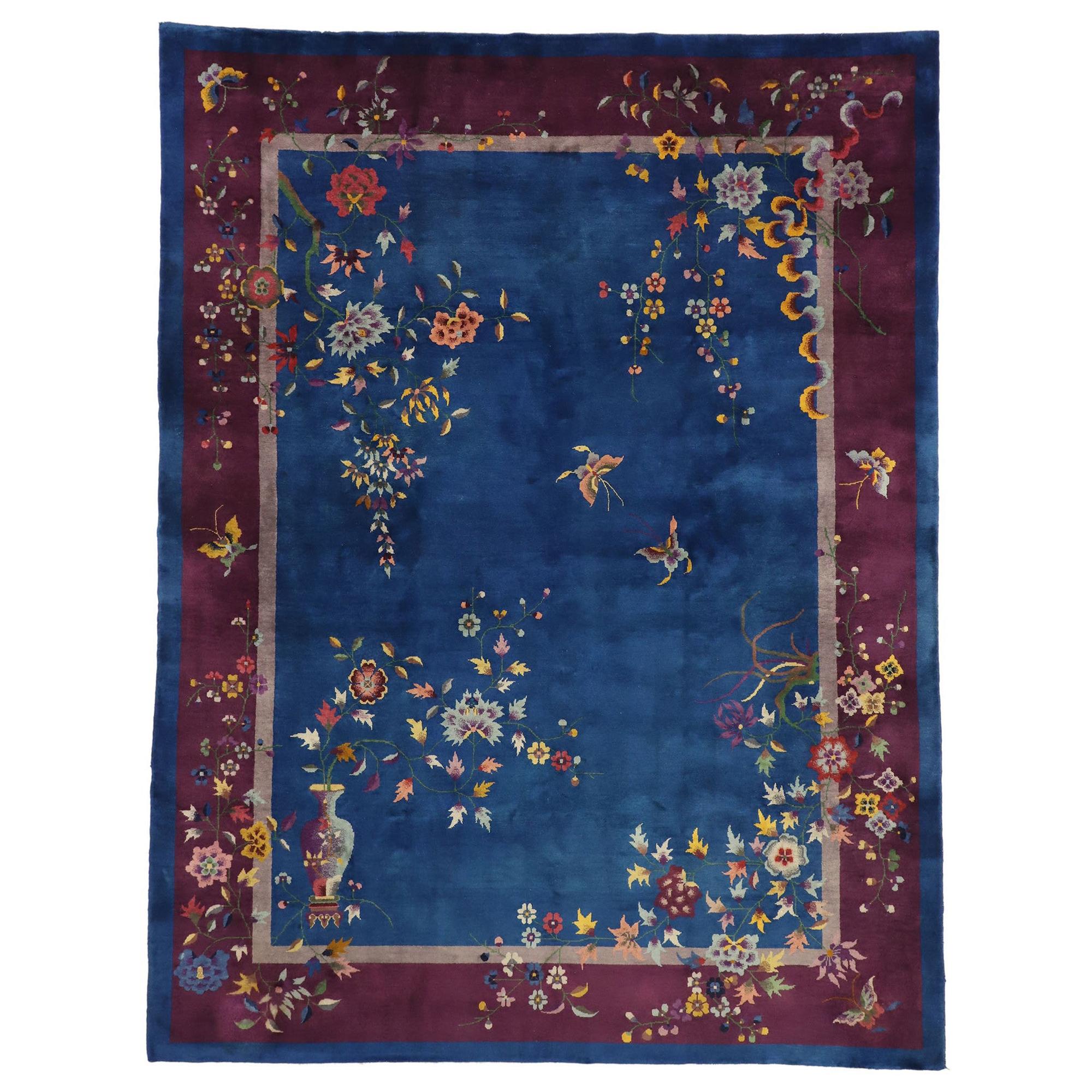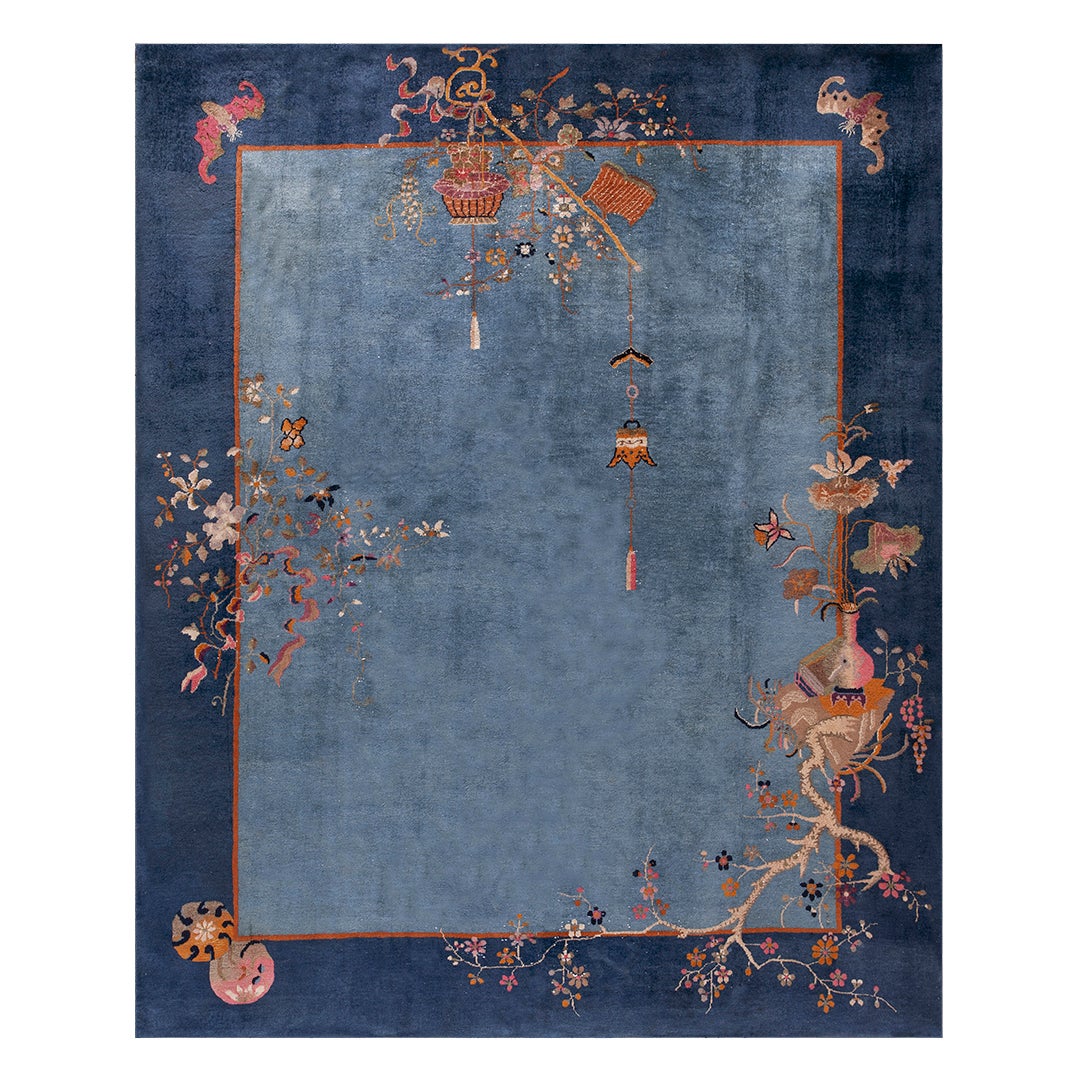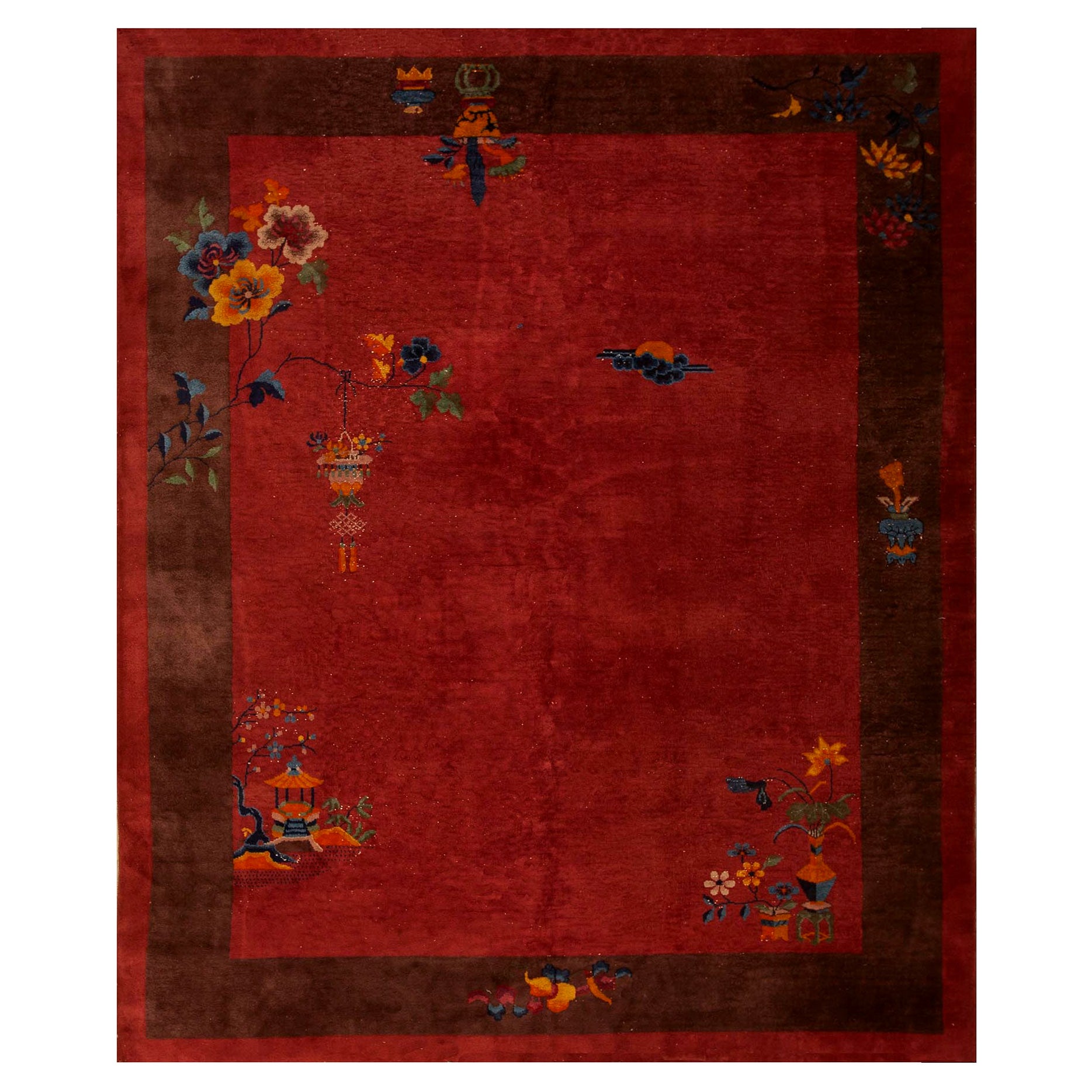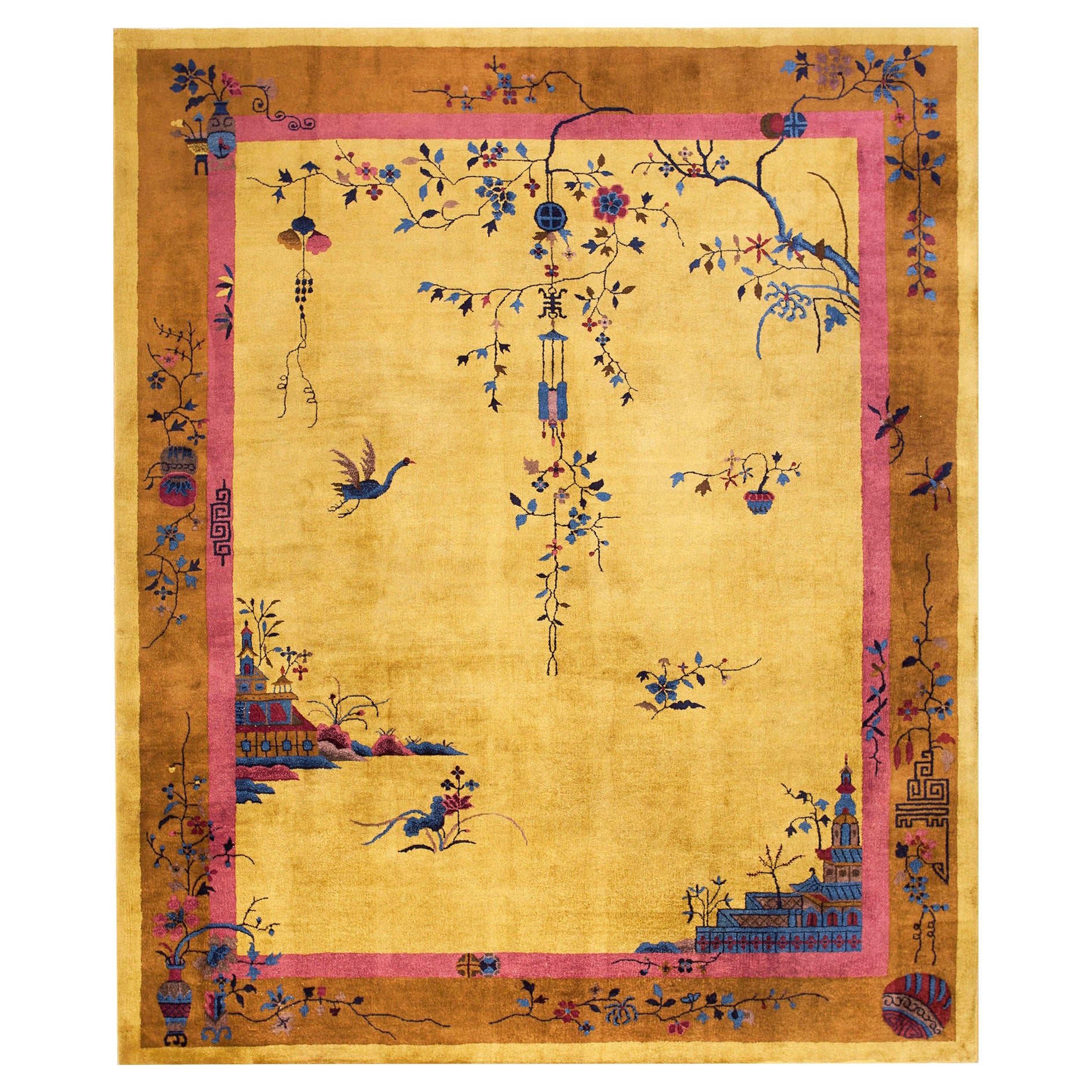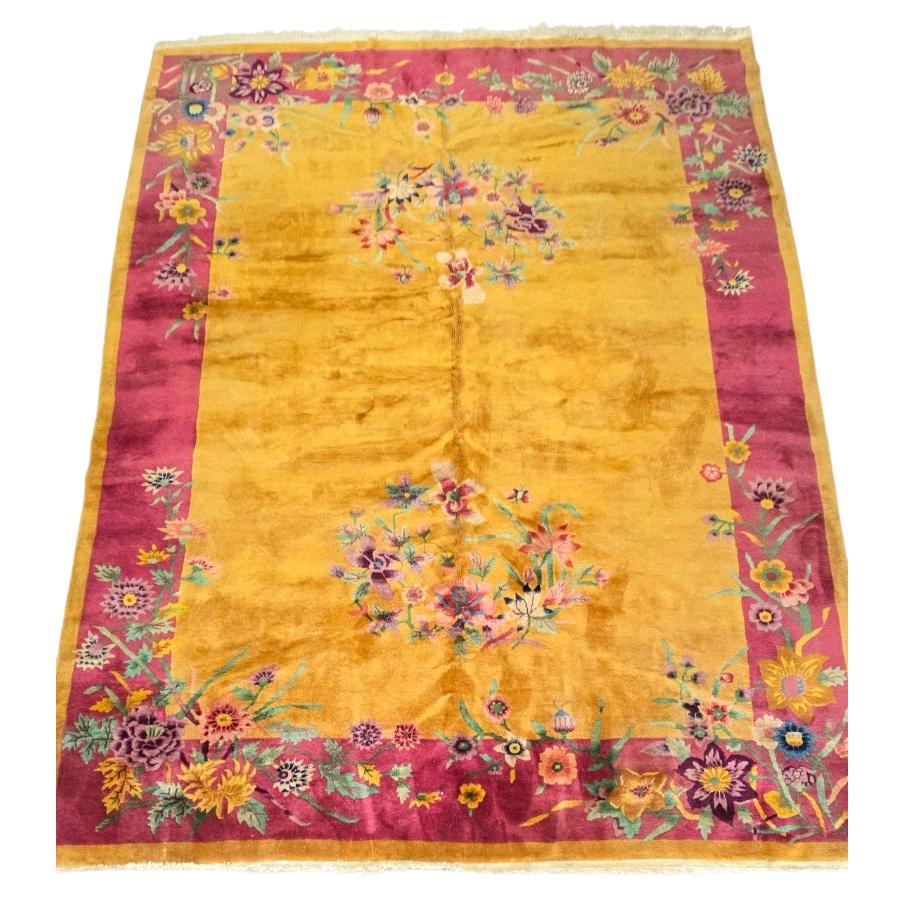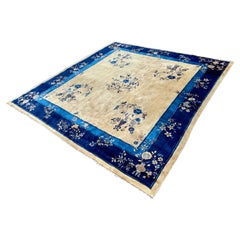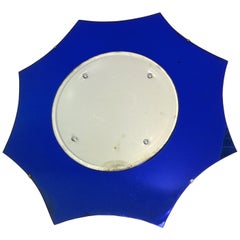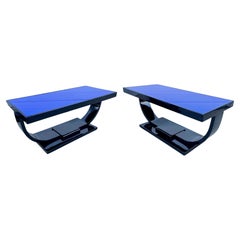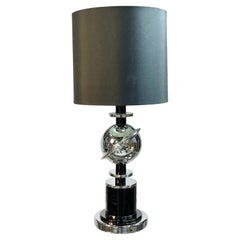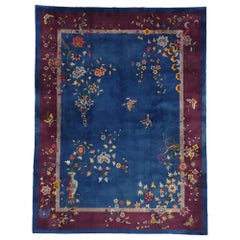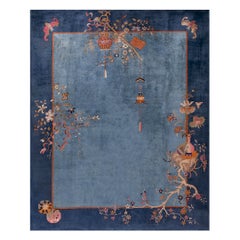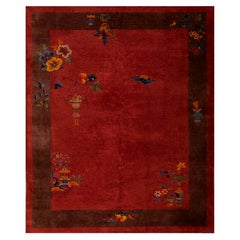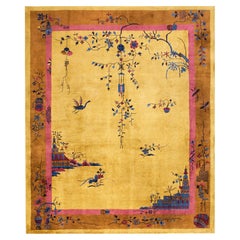Items Similar to 1920's Chinese Art Deco Rug - 8' x 9'9" Red & Blue
Want more images or videos?
Request additional images or videos from the seller
1 of 21
1920's Chinese Art Deco Rug - 8' x 9'9" Red & Blue
About the Item
SATURDAY SALE
Room sized (96" x 117") Chinese Art Deco rug attributed to Walter Nichols in hand knotted wool with burgundy red field and navy blue border including floral, geometric and wan characters. Recently professionally cleaned by an Oriental rug specialist.
"In Search of Walter Nichols" By Elizabeth Bogen
Whatever his rightful place in carpet history turns out to be, it is undoubtedly true that Walter Abner Burns Nichols was one of the most colorful of the American adventurer/entrepreneurs in 1920s Tientsin. With his flyaway hair and his Santa-like joviality, he was well known and loved by the English-speaking community and by the Chinese who worked with him or for him.
The Nichols name has come to be used almost synonymously with the 'Chinese deco' rugs manufactured in Tientsin in the 1920s and 1930s. Nichols did not originate the Chinese deco style, but he did a great deal to popularize it and to maintain its high standards of manufacture. At the point of greatest demand for his carpets, his American distributor, the Pande-Cameron Company, was importing 30,000 square feet a month, equivalent to about 3,000 room-size rugs.
Nichols and his wife Edith (also known as Sarah) were childless; there was no family scribe to record their history as Mary Setton did for her rug-making parents, Helen and Franklin Fette. Yet Nichols left behind a host of business associates and their children who remember him vividly. Much of the material for this article was supplied by members of his 'family' at Pande-Cameron: Hilton Hodges and his son Dan Hodges in New York, and M. Paul Andonian and his son Paul M. Andonian, in Seattle. Another important source was Art Harris of Honolulu, who was a close friend and business associate of Nichols' for the last 10 years of Nichols' working life.
Hilton Hodges and M. Paul Andonian each joined Pande-Cameron in 1929, Mr. Hodges in the New York office and Mr. Andonian in Seattle. Mr. Hodges is now 87, Mr. Andonian 90. Mr. Harris is 80. Nichols was born in New York City around 1885. Virtually nothing is known of his early years. By young adulthood, however, he is known to have become a first-class wool grader who went to Tientsin around 1920 to work for the Elbrook family of wool merchants. Nichols started his own business a couple of years later. I n a brochure he produced in the late '20s, with the assistance of Pande-Cameron, he announced modestly that: "In 1924 W.A.B. Nichols of Tientsin, North China, introduced the Super Chinese Rug which has become world famous. It is known in every market as the most durable and beautiful product of the modern Chinese weavers art and adorns the homes of people all over the earth."
Nichols' rugs were sold over quite a bit of the earth. Pande-Cameron marketed the rugs in the United States and Canada; Nichols himself had showrooms or agents in Peking, Shanghai, Tientsin, Hong Kong, Manila, Honolulu, Panama, London and Australia. At the height of his business, he had 14 factories in China, most of them in Tientsin, but the one of which he may have been most proud was in a former Manchu prince's palace in Peking.
Machine-Spun Yarn
The business was called "Nichols Super Yarn and Carpets." American wool exporters in Tientsin, such as Elbrook and Karagheusian, had begun to machine-spin their yarn around 1920, and it was this machine-spun yarn that earned the designation "super". Nichols rugs, and the Tientsin rugs in general, were very tightly packed and close-backed, so Nichols' claims of their excellence and durability were in many ways true. (They weighed about a pound per square foot.) Furthermore, Nichols used Chinese wool and German dyes of excellent quality, and he guaranteed his colors fast to light and washing.
Nichols' contribution to the quality of the Tientsin rugs was immediate, but his influence on the Chinese deco style was negligible at first. He made what other Tientsin rug manufacturers were making. "They all borrowed designs from one another. In the late 1920s, however, Nichols began to have significant influence on style--a dampening influence, some think--as a consequence of his association with his American distributor, Pande-Cameron.
According to Hilton Hodges, Nichols ran into Col. Pande in 1927 in the rug department of B. Altman & Company, New York. Nichols complained to Col. Pande that no one in the United States would tell him what style of rug to make for the American market. Col. Pande complained to Nichols that rug manufacturers in China paid little attention to American tastes. The 1920s Decos, rug salesmen told him, were too colorful, too busy and too --Chinese. Pande wanted simpler rugs, rugs with no borders, no animals to step on, and no mysterious Chinese symbols that could provoke arguments between salesmen and customers; rugs with fewer colors and fewer flowers.
After their fateful meeting, Nichols began to modify his designs as Col. Pande (and the tastemakers in Altman's rug department) suggested. Now many of his rugs were of a solid color with one or two small sprays o f flowers in diagonal corners. Eventually the flowers went, and the rugs were essentially monochromatic tone-on-tones, often with considerable carving. Once broadloom carpeting hit the market, the pressure for simplified rugs only increased.
Still, in his commissioned work, Nichols made whatever he was asked. He used French, Indian and Peking designs in carpets for offices, palaces, hotels and homes. He produced rugs that were dead ringers for Helen and Franklin Fette's Peking production. From today's distant vantage point, it is often impossible to distinguish one manufacturer's carpets from another's. A rug is unarguably a Nichols only if one finds stenciled on the skirt: HAND MADE IN CHINA BY NICHOLS. If the skirt is gone, there is only hypothesis.
Three Fortunes Lost
Nichols made and lost three fortunes in China. He lost the first in the early '30s, having over expanded as the Depression deepened. Nichols Super Yarns and Carpets was bankrupt. An American banker in Tientsin, Dave Gill, h helped his friend Nichols reorganize his business as Nichols Chinese Rugs.
The second fortune was lost in the late 1930s after the Japanese invaded China and World War II began. Nichols stayed on in China for a while, but he soon sought safer working room in Mexico, where he was agent and quality controller for D.N. & E. Walters, an American firm of rug and textile distributors.
After the war ended, Nichols returned to Tientsin. Hilton Hodges recalls that the Japanese had used Nichols' rug washing equipment to wash Army uniforms and had turned his home in to a hospital. Nichols' servants were delighted at his return and helped him to recover much of his factory equipment. He made rugs again for about two years--years of concentrated productivity and important commissions. Nichols was particularly proud of making carpets in 1946 for the ambassadorial residence of Gen. George C. Marshall, and in 1947 for then-princess Elizabeth, as a wedding gift from the British people.
In 1948, a heart attack sent Nichols to a hospital in Hong Kong. With the Communists fast approaching Tientsin, Hilton Hodges flew to China to close out Nichols' business and to rescue what he could of the inventory. With the Communist takeover, Nichols' third fortune was lost.
Nevertheless, Nichols opened a business in Honolulu the next year, selling stock from his Chinese production, along with his own collection of Chinese objects and miscellaneous textiles imported from the U.S. and Japan.
It was in Honolulu that Nichols met Art Harris. Harris ran a rug cleaning business that Nichols used and recommended, and the two men were friends and colleagues for the next 10 years. In 1959 or 1960, another he art attack forced Nichols to retire for good. He left the remaining stock to his former banker friend Dave Gill, from whom Harris acquired it in 1963 or 1964.
After Nichols' heart attack, he and his wife left Hawaii for California; they lived with her sister for the short time before Nichols' death in 1960. In May 1961, Mrs. Nichols brought his ashes east for burial in her family plot, where she ultimately was buried beside him. The plot is probably in New Jersey, but its exact location is unknown.
©Copyright 1996, Museum Books, Inc., USA. All Rights Reserved.
- Attributed to:Walter Nichols (Weaver)
- Dimensions:Width: 96 in (243.84 cm)Length: 117 in (297.18 cm)
- Style:Art Deco (Of the Period)
- Materials and Techniques:Wool,Hand-Knotted
- Place of Origin:
- Period:
- Date of Manufacture:1920's
- Condition:Rewoven. Wear consistent with age and use. Professionally deep cleaned Sept 2023.
- Seller Location:Hanover, MA
- Reference Number:1stDibs: LU886636166992
About the Seller
4.9
Platinum Seller
Premium sellers with a 4.7+ rating and 24-hour response times
Established in 2008
1stDibs seller since 2010
1,081 sales on 1stDibs
Typical response time: 1 hour
- ShippingRetrieving quote...Shipping from: Hanover, MA
- Return Policy
Authenticity Guarantee
In the unlikely event there’s an issue with an item’s authenticity, contact us within 1 year for a full refund. DetailsMoney-Back Guarantee
If your item is not as described, is damaged in transit, or does not arrive, contact us within 7 days for a full refund. Details24-Hour Cancellation
You have a 24-hour grace period in which to reconsider your purchase, with no questions asked.Vetted Professional Sellers
Our world-class sellers must adhere to strict standards for service and quality, maintaining the integrity of our listings.Price-Match Guarantee
If you find that a seller listed the same item for a lower price elsewhere, we’ll match it.Trusted Global Delivery
Our best-in-class carrier network provides specialized shipping options worldwide, including custom delivery.More From This Seller
View All1920's Peking Chinese Art Deco Rug 9' x 10'
Located in Hanover, MA
SATURDAY SALE
Room sized (109" x 119") Peking Chinese art deco rug from late teens early 1920's in hand knotted wool with golden beige field and navy blue border with floral motifs....
Category
Vintage 1920s Chinese Art Deco Chinese and East Asian Rugs
Materials
Wool
$3,700 Sale Price
50% Off
Art Deco Cobalt Blue Wall Mirror
Located in Hanover, MA
1930s American star pointed midnight blue glass mirror with round beveled glass silver mirror applied on center with four chromed cap fittings, clipped t...
Category
Vintage 1930s American Art Deco Wall Mirrors
Pair of American Art Deco Side Tables Black Lacquer & Cobalt Blue Mirror
Located in Hanover, MA
Pair of American Art Deco low tables in elongated U-form of miniature console tables with cobalt blue mirror inset tops.
These tables were originally dark walnut but in the last ten ...
Category
Vintage 1940s American Art Deco Side Tables
Materials
Mirror, Walnut
Art Deco Saturn Desk Lamp
Located in Hanover, MA
American art deco chrome and black enamel ringed Saturn desk lamp.
Shown with a 7.75" High by 8.75" Diameter black drum shade
Category
Vintage 1930s American Art Deco Table Lamps
Materials
Metal, Chrome
American Art Deco Glass Dome Bowl Chandelier
Located in Hanover, MA
Large opaque white glass dome/bowl supported in a five ring belt of brass embellished with silver X's, suspended by four brass rods hooked on a central canopy. Takes three standard E...
Category
Vintage 1970s American Art Deco Chandeliers and Pendants
Materials
Brass
Helene Curtis Art Deco Square Table
By Gilbert Rohde
Located in Hanover, MA
Please note this table can be flat packed so ask us for a shipping quote.
Charming original Bauhaus style square table in the style of Gilbert Rohde produced by Helene Curtis Industr...
Category
Vintage 1930s American Art Deco Game Tables
Materials
Chrome
You May Also Like
Antique Blue Chinese Art Deco Rug
By Walter Nichols
Located in Dallas, TX
77231 Antique Chinese Art Deco Rug, 08'09 x 11'06. Antique Chinese Art Deco rugs are a style of rugs produced in China during the 1920s and 1930s, blending traditional Chinese rug-ma...
Category
Early 20th Century Chinese Art Deco Chinese and East Asian Rugs
Materials
Wool
1920s Chinese Art Deco Carpet ( 8' x 9'9" - 244 x 298 )
Located in New York, NY
1920s Chinese Art Deco Carpet ( 8' x 9'9" - 244 x 298 )
Category
Vintage 1920s Chinese Art Deco Chinese and East Asian Rugs
Materials
Wool
$7,040 Sale Price
20% Off
1920s Chinese Art Deco Carpet ( 8' x 9'9" - 245 x 298 )
Located in New York, NY
1920s Chinese Art Deco Carpet ( 8' x 9'9" - 245 x 298 )
Category
Vintage 1920s Chinese Art Deco Chinese and East Asian Rugs
Materials
Wool
$7,200 Sale Price
20% Off
1920s Chinese Art Deco Carpet ( 8' x 9'9" - 245 x 297 cm )
Located in New York, NY
1920s Chinese Art Deco Carpet ( 8' x 9'9" - 245 x 297 cm )
Category
Vintage 1920s Chinese Art Deco Chinese and East Asian Rugs
Materials
Wool
$10,880 Sale Price
20% Off
1920s Art Deco Nichols Chinese Rug Green & Pink 9x13
By Walter Nichols
Located in Los Angeles, CA
The most recognizable rugs from the 1920s and 1930s are Chinese Rugs made by Walter Nichols. These Nichols rugs, as they came to be known, were primarily made during the Art Deco mov...
Category
Early 20th Century Chinese Art Deco Chinese and East Asian Rugs
Materials
Wool
1920s Art Deco Nichols Chinese Floral Rug Excellent condition 9x11.6
By Walter Nichols
Located in Los Angeles, CA
The most recognizable rugs from the 1920s and 1930s are Chinese Rugs made by Walter Nichols. These Nichols rugs, as they came to be known, were primarily made during the Art Deco mov...
Category
Early 20th Century Chinese Art Deco Chinese and East Asian Rugs
Materials
Wool
$7,520 Sale Price
20% Off
Recently Viewed
View AllMore Ways To Browse
1920s Gifts
8x8 Rug Square
80s Art Deco Art
Princess Elizabeth
1930s Mexican Furniture
Antique Machine Made Rug
B Altman
Saturday Sale
80s Rug
Antique Hawaiian Furniture
Washing Feet
90s Rug
Palace Size Oriental Rug
Marshall Fields And Company
Shanghai 1930s
10x14 Chinese Art Deco Rug
Chinese Deco Rug 10x14
Blue Oriental Rug 8 X 10
